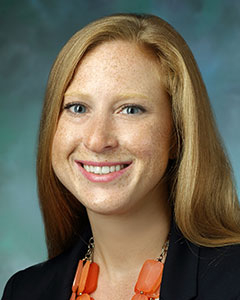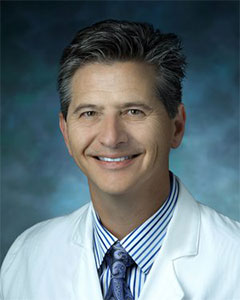In Remembrance
View remembrance for:
Lauren E. Benishek, Ph.D.

Lauren E. Benishek was an Assistant Professor at the Armstrong Institute for Patient Safety and Quality and in the Department of Anesthesiology and Critical Care Medicine, first joining the Armstrong Institute as a Postdoctoral Fellow in 2014 before advancing to Assistant Professor in 2016.
Lauren was an earnest, helpful and kind colleague and friend to the people that made up the Armstrong Institute. She believed that small actions have big impacts. This belief was embodied in her approaches to show how all people are important and in her efforts to nurture a kinder culture valuing personal meaning, well-being and psychological safety for all. Lauren found that authentic, high-quality relationships affect individuals and efficiencies in healthcare communities. Further, she observed that better interpersonal dynamics and teamwork connectivity were rooted in relationships that engender feelings of safety and of trust.
Quintessentially Lauren, written above her desk were the words: “To help others find balance, joy, resilience, and calm...Start where you are. Use what you have. Do what you can.”
Accordingly, Lauren’s work supported high-quality, safe patient care through understanding and optimizing workplace conditions to improve the lives of healthcare professionals, with a focus on interpersonal and team-based dynamics, safety and workforce well-being and engagement. Moreover, she wanted to understand the complicated interplay between systems innovations, the impacts of innovations on personal connections and on individuals and patient safety. In national and multinational collaborations with researchers and front-line operations members, she developed, implemented and demonstrated the effectiveness of a variety of complementary patient safety interventions and workforce well-being interventions with the goal of delivering the highest-quality care. This work extended to a number of training programs aimed at improving clinician and staff knowledge, skills and attitudes about safety science, teamwork and clinical best practices. Collectively, her efforts highlighted that providing safe and effective care to patients requires physically and psychologically healthy healthcare workers.
Her work has resulted in over scholarly 50 articles published in leading journals, including the Journal of Applied Psychology, Frontiers of Psychology, the Joint Commission Journal on Quality and Patient Safety, JAMA Surgery and Infection Control and Hospital Epidemiology. To support her valuable work, she received funding from local, national and international sources including the Johns Hopkins School of Medicine, the Anesthesia Patient Safety Foundation, the National Institute for Occupational Safety and Health, the Agency for Healthcare Research and Quality, the Centers for Disease Control and Prevention and the Dutch Society of Surgeons.
Sean M. Berenholtz, M.D., M.H.S.

Sean M. Berenholtz had a deep impact on the Armstrong Institute for Patient Quality and Safety. He was a cherished mentor and friend, a champion of interdisciplinary work, and a distinguished clinician and colleague whose dedication to improving patient safety and quality of care left an indelible mark on all of us. Sadly, Berenholtz lost his life to pancreatic cancer in the spring of 2024. His legacy as a leader, educator and wonderful human being will continue to influence and inspire.
Berenholtz was a founding member of the Armstrong Institute when it was founded as the Quality and Safety Research Group in the early 2000s.
He completed his internship at LDS Hospital in Utah in 1996. and then He then completed his residency at Johns Hopkins and became an adult critical care medicine (ACCM) fellow in 2000. In 2003, Berenholtz earned a master's degree in clinical investigation through the Johns Hopkins Bloomberg School of Public Health. He was promoted to professor in 2014. He held joint appointments in the departments of surgery and health policy management at the School of Public Health. Berenholtz demonstrated committed citizenship to The Johns Hopkins University, holding prominent leadership roles as the medical director of perioperative safety in ACCM, director of inpatient quality and safety for the Armstrong Institute and a member of the institute’s executive committee.
Recognized as a national and international leader in translating research into practice to improve patient safety and quality, he held pivotal roles in the landmark Keystone ICU and the nationwide On the CUSP: Stop BSI projects. He was also a crucial part of other major multisite studies disseminating the Comprehensive Unit-based Safety Program (CUSP) and prevention bundles for a range of safety issues, including ventilator-associated events, surgical site infections, maternity care best practices and MRSA prevention. He was a leader for several national and international task forces to improve patient safety and quality of care across the country and around the globe. Sean helped develop a World Health Organization-sponsored curriculum to teach international scholars about patient safety research and co-led a program to improve patient safety and culture among a cohort of five African hospitals. He directed a program to reduce central line-associated bloodstream infections (CLABSIs) in a cohort of hospitals in Peru, and another to reduce CLABSIs and improve culture in eight hospitals in Abu Dhabi, United Arab Emirates. Berenholtz was senior author on “Ventilator-Associated Pneumonia Prevention” for the 2012 and 2023 Compendium of Strategies to Prevent Healthcare-Acquired Infections in Acute Care Hospitals for the Society for Healthcare Epidemiology of America.
In recognition of his expertise and efforts, he garnered numerous honors including the 2011 Barry Farr Award from the Society of Healthcare Epidemiology and a 2012 Presidential Citation Award from the Society of Critical Care Medicine. His manuscripts were published in the top-ranked journals of his field including the New England Journal of Medicine, JAMA Internal Medicine, The BMJ, Circulation, Critical Care Medicine, Intensive Care Medicine and Anesthesiology. He served on several U.S. Agency for Healthcare Research and Quality, Centers for Medicare & Medicaid Services and WHO technical expert panels and presidential advisory panels related to improving patient safety and quality of care.
Aligned with his commitment to serving as an educator and mentor, Berenholtz was deeply involved with efforts to develop training programs for the Baltimore County Fire Department and the prehospital emergency medical services system. He was named the 2019 Baltimore County Council Provider of the Year, 2020 Maryland State Firemen’s Association EMS Person of the Year and Maryland General Assembly EMS Provider of the Year. Berenholtz was also a recipient of the 2022 Baltimore County Volunteer Firefighters Association’s President’s Award as well as a 2023 Baltimore County Fire Department Commendation Award.
Berenholtz is remembered by the Armstrong Institute through the Sean Berenholtz Award, given at the institute’s annual Quality, Safety and Service Summit.
